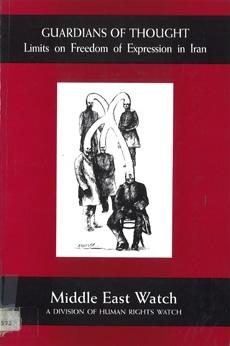
Guardians of Thought
Limits on Freedom of Expression in Iran
Middle East Watch
Human Rights Watch
The apparent intensity of public debate, variety of publications and the wealth of artistic achievements in the Islamic Republic of Iran create an illusion of unrestricted discourse. The limits on expression are defined, however, in complex and often arbitrary ways by a government beset by internal power struggles and intolerance. The artistic and intellectual community's resistance to state-imposed censorship has produced some relaxation of control since the period immediately following the 1979 Islamic revolution, but the parameters of what is permitted tend to shift quickly, in response to pressures within the ruling movement. It is never clear whether what can be said, written or filmed today will be cause for financial ruin, arrest or other punishment tomorrow.
In Guardians of Thought, which covers primarily the past four years, Middle East Watch examines the various mechanisms of state control of expression and presents more than sixty individual cases (and one group case involving 161 people) of Iranian writers, filmmakers, journalists and intellectuals who have been imprisoned, prosecuted or otherwise punished for the content of their work or whose work has been banned and censored. The breadth of censorship goes well beyond the cases examined here,- these only serve to illustrate tactics of direct and often violent pressure by vigilante groups, of defamation campaigns, of formal censorship, and of the power play between different pressure groups within the ruling elite. Middle East Watch calls on the Iranian government to change its policies and protect the right of free expression, both through legal provisions that guarantee protection and through the punishment of acts that seek to undermine that protection.
| 